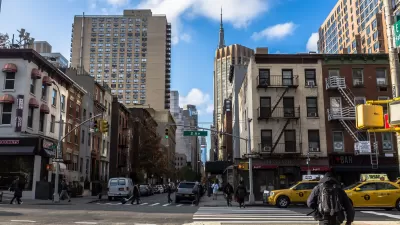In a scathing op-ed for The New York Times, architect Robert Stern challenges the city's drive to densify East Midtown without paying the requisite attention to preservation, infrastructure, and the elements that give vitality to great cities.
"Last summer the Department of City Planning released its East Midtown study, envisioning a taller, denser, shinier future for the neighborhood around Grand Central. New and more liberal regulations that will allow bigger office towers are on their way to the City Council for approval before the end of Mayor Michael R. Bloomberg’s current term."
"But what is a modern city, exactly?" asks Stern. "And is New York really in danger of falling behind new global cities like Shanghai?"
"I’m nearly always an advocate of density: it’s socially beneficial and environmentally responsible. And I like tall buildings as much as the next architect, especially if I’m asked to design them," he adds. "But the advantages of density can go only so far without the infrastructure to support it. And the appropriateness of tall buildings is a question of where and when, and what they contribute to the public realm."
"The proposed East Midtown up-zoning doesn’t give anything back to New York," Stern concludes. "It’s all about real estate and not about place-making, or should I say, place-saving."
FULL STORY: A Modern City in East Midtown?

Maui's Vacation Rental Debate Turns Ugly
Verbal attacks, misinformation campaigns and fistfights plague a high-stakes debate to convert thousands of vacation rentals into long-term housing.

Planetizen Federal Action Tracker
A weekly monitor of how Trump’s orders and actions are impacting planners and planning in America.

San Francisco Suspends Traffic Calming Amidst Record Deaths
Citing “a challenging fiscal landscape,” the city will cease the program on the heels of 42 traffic deaths, including 24 pedestrians.

Defunct Pittsburgh Power Plant to Become Residential Tower
A decommissioned steam heat plant will be redeveloped into almost 100 affordable housing units.

Trump Prompts Restructuring of Transportation Research Board in “Unprecedented Overreach”
The TRB has eliminated more than half of its committees including those focused on climate, equity, and cities.

Amtrak Rolls Out New Orleans to Alabama “Mardi Gras” Train
The new service will operate morning and evening departures between Mobile and New Orleans.
Urban Design for Planners 1: Software Tools
This six-course series explores essential urban design concepts using open source software and equips planners with the tools they need to participate fully in the urban design process.
Planning for Universal Design
Learn the tools for implementing Universal Design in planning regulations.
Heyer Gruel & Associates PA
JM Goldson LLC
Custer County Colorado
City of Camden Redevelopment Agency
City of Astoria
Transportation Research & Education Center (TREC) at Portland State University
Jefferson Parish Government
Camden Redevelopment Agency
City of Claremont



























